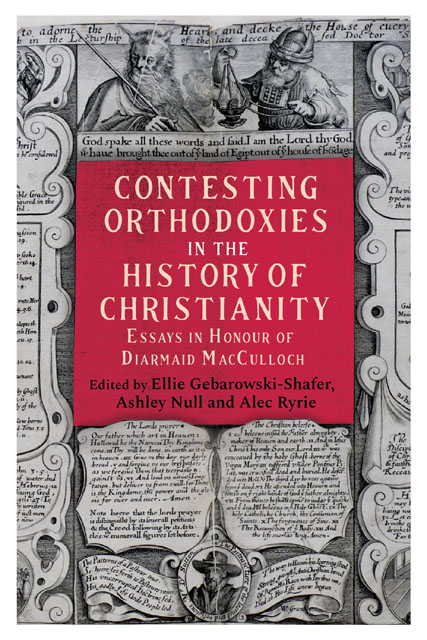Book contents
- Frontmatter
- Contents
- List of Illustrations
- List of Contributors
- List of Abbreviations
- Introduction
- 1 ‘Jewish Christianity’ in Antiquity: Meaningless Category or Heuristic Irritant?
- 2 ‘Sola Fide’: the Wrong Slogan?
- 3 Both Cromwellian and Augustinian: the Influence of Thomas Cromwell on Reform within the Early Modern English Austin Friars
- 4 Lex, Rex and Sex: The Bigamy of Philipp of Hesse and the Lutheran Recourse to Natural Law
- 5 The Authority of Scripture in Reformation Anglicanism: Then and Now
- 6 Orthodoxy and Heresy in the Post-Reformation
- 7 Profanity and Piety in the Church Porch: the Place of Transgression in Early Modern England
- 8 Writing on the Walls: Word and Image in the Post-Reformation English Church
- 9 The Myth of the Church of England
- 10 Mysticism, Orthodoxy and Reformed Identity before the English Revolution: the Case of John Everard
- 11 Sacrilege and the Sacred in England’s Second Reformation, 1640–1660
- 12 ‘I had not the patience to be quiet’: Arthur Bury and The Naked Gospel
- 13 ‘A soul-corrupting indifferentism’: the Intellectual Development of Benjamin Henry Latrobe
- 14 Newman, Dogma and Freedom in the Church
- 15 ‘Tommy, ’ow’s yer soul?’ Reconsidering Religion and the British Soldier
- 16 The King James Vulgate
- 17 The Myth of the Anglican Communion?
- Select bibliography of Diarmaid MacCulloch’s scholarly publications
- Bibliography
- Index
- Tabula Gratulatoria
- Studies in Modern British Religious History
6 - Orthodoxy and Heresy in the Post-Reformation
Published online by Cambridge University Press: 09 January 2024
- Frontmatter
- Contents
- List of Illustrations
- List of Contributors
- List of Abbreviations
- Introduction
- 1 ‘Jewish Christianity’ in Antiquity: Meaningless Category or Heuristic Irritant?
- 2 ‘Sola Fide’: the Wrong Slogan?
- 3 Both Cromwellian and Augustinian: the Influence of Thomas Cromwell on Reform within the Early Modern English Austin Friars
- 4 Lex, Rex and Sex: The Bigamy of Philipp of Hesse and the Lutheran Recourse to Natural Law
- 5 The Authority of Scripture in Reformation Anglicanism: Then and Now
- 6 Orthodoxy and Heresy in the Post-Reformation
- 7 Profanity and Piety in the Church Porch: the Place of Transgression in Early Modern England
- 8 Writing on the Walls: Word and Image in the Post-Reformation English Church
- 9 The Myth of the Church of England
- 10 Mysticism, Orthodoxy and Reformed Identity before the English Revolution: the Case of John Everard
- 11 Sacrilege and the Sacred in England’s Second Reformation, 1640–1660
- 12 ‘I had not the patience to be quiet’: Arthur Bury and The Naked Gospel
- 13 ‘A soul-corrupting indifferentism’: the Intellectual Development of Benjamin Henry Latrobe
- 14 Newman, Dogma and Freedom in the Church
- 15 ‘Tommy, ’ow’s yer soul?’ Reconsidering Religion and the British Soldier
- 16 The King James Vulgate
- 17 The Myth of the Anglican Communion?
- Select bibliography of Diarmaid MacCulloch’s scholarly publications
- Bibliography
- Index
- Tabula Gratulatoria
- Studies in Modern British Religious History
Summary
How can one define and defend orthodoxy when the very notion itself is fluid and contested? This essay examines how the very concept of ‘orthodoxy’ itself was fought over during the Reformation era, with the new Lutheran and Reformed establishments being quick to clothe themselves in the language of orthodoxy and their enemies in that of heresy, in the same way that Protestant historians from the Reformed martyrologists to the Magdeburg Centuriators positioned themselves, not their Roman Catholic opponents, as the true heirs of ancient and medieval Christendom. In the process, these new establishments unwittingly demonstrated that the doctrinal content of orthodoxy can be less important than the language in which it is dressed. Ambiguous terminology and shifting definitions can create a reassuring illusion of continuity even amid a period of dislocating change. Shifts in orthodoxy are not exactly what they seem, and the essay shows how dramatic shifts can be downplayed, presented as mere elucidations of existing principles, or described as reversions to an older truth that has become corrupted. The more dramatic a reform, the more urgent the need to present it as seamless continuity.
The sixteenth-century Reformation wrought major changes, often underestimated, on the definition of key words and concepts in Christian theology. For centuries the Latin West had generally agreed on the idea of ‘orthodox’ belief and teaching – even if not on all aspects of its content. ‘Orthodoxy’ resided in the communities of faith belonging to the true and authentic Church. In the misleading but often-quoted phrase of St Vincent of Lérins (d. c. 450), the Catholic faith was ‘that which has been believed everywhere, always and by all’. Vincent devised this phrase precisely in order to define the Catholic faith against the abundance of past heresies, and to find a path through the exotic diversity of interpretations of canonical Scripture. Orthodoxy was social and political: it was what the authoritative voices believed and taught. Further, orthodoxy was for many centuries defined largely by its opposite, heresy. ‘Orthodoxy’ emerged from conflict: over many decades it eventually became accepted that (for instance) Arian views on the Trinity were ‘heretical’ and Athanasius’s views were ‘orthodox’. Nevertheless, by the late fourteenth century Jean Courtecuisse (d. 1423) could claim that every possible heresy had already been condemned either implicitly or explicitly.
- Type
- Chapter
- Information
- Contesting Orthodoxies in the History of ChristianityEssays in Honour of Diarmaid MacCulloch, pp. 98 - 119Publisher: Boydell & BrewerPrint publication year: 2021



